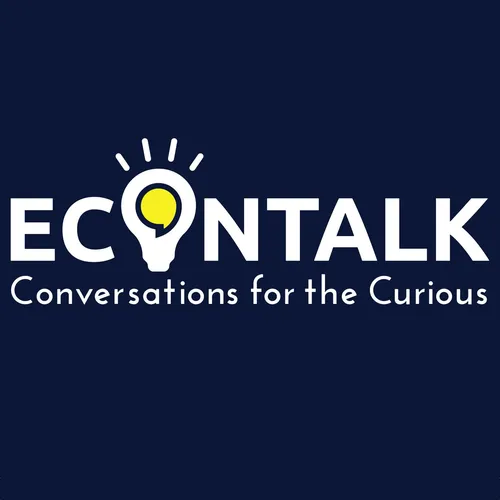
EconTalk
EconTalk: Conversations for the Curious is an award-winning weekly podcast hosted by Russ Roberts of Shalem College in Jerusalem and Stanford's Hoover Institution. The eclectic guest list includes authors, doctors, psychologists, historians, philosophers, economists, and more. Learn how the health care system really works, the serenity that comes from humility, the challenge of interpreting data, how potato chips are made, what it's like to run an upscale Manhattan restaurant, what caused the 2008 financial crisis, the nature of consciousness, and more. EconTalk has been taking the Monday out of Mondays since 2006. All 900+ episodes are available in the archive. Go to EconTalk.org for transcripts, related resources, and comments.
- Update frequency
- every 7 days
- Average duration
- 68 minutes
- Episodes
- 1015
- Years Active
- 2006 - 2025

Bruce Bueno de Mesquita on the Spoils of War
There is a fascinating and depressing positive correlation between the reputation of an American president and the number of people dying in wars while that president is in office. Political scientis…

Thomas Leonard on Race, Eugenics, and Illiberal Reformers
Were the first professional economists racists? Thomas Leonard of Princeton University and author of Illiberal Reformers talks with EconTalk host Russ Roberts about his book--a portrait of the progre…

Doug Lemov on Reading
Doug Lemov of Uncommon School and co-author of Reading Reconsidered talks with EconTalk host Russ Roberts about reading. Lemov makes the case for the educational importance of critical reading of cha…

Erik Hurst on Work, Play, and the Dynamics of U.S. Labor Markets
Erik Hurst of the University of Chicago talks with EconTalk host Russ Roberts about the state of the labor market in the United States. Hurst notes dramatic changes in employment rates for men and sp…

Tim Harford on the Virtues of Disorder and Messy
Tim Harford, journalist and author, talks with EconTalk host Russ Roberts about his latest book, Messy. Harford argues that we have a weakness for order and neat solutions causing us to miss opportun…

David Gelernter on Consciousness, Computers, and the Tides of Mind
David Gelernter, professor of computer science at Yale University and author of The Tides of Mind, talks with EconTalk host Russ Roberts about consciousness and how our minds evolve through the cours…

Judith Donath on Signaling, Design, and the Social Machine
Judith Donath, author of The Social Machine, talks with EconTalk host Russ Roberts about the ideas in her book--an examination of signaling, online identity, and online community. Donath argues that …

Casey Mulligan on Cuba
Casey Mulligan of the University of Chicago talks with EconTalk host Russ Roberts about life in Cuba. Mulligan, who recently returned from a trip to Cuba, discusses the economy, the standard of livin…

Chris Arnade on the Mexican Crisis, TARP, and American Poverty
Chris Arnade, former Wall Street trader turned photographer and social chronicler, talks with EconTalk host Russ Roberts about what he learned from the front lines of the financial industry in the 19…

Angus Deaton on Inequality, Trade, and the Robin Hood Principle
Nobel Laureate in Economics Angus Deaton of Princeton University talks with EconTalk host Russ Roberts about the economics of trade and aid. Deaton wonders if economists should re-think the widely-he…

Cathy O'Neil on Weapons of Math Destruction
Cathy O'Neil, data scientist and author of Weapons of Math Destruction talks with EconTalk host Russ Roberts about the ideas in her book. O'Neil argues that the commercial application of big data oft…

John Cochrane on Economic Growth and Changing the Policy Debate
How are those in favor of bigger government and those who want smaller government like a couple stuck in a bad marriage? Economist John Cochrane of Stanford University's Hoover Institution talks with…

Eric Wakin on Archiving, Preservation, and History
What does an x-ray of Hitler's skull have in common with a jar of Ronald Reagan's jelly beans? They are both part of the Hoover Institution archives. Eric Wakin, Director of the Library and Archives …

Susan Athey on Machine Learning, Big Data, and Causation
Can machine learning improve the use of data and evidence for understanding economics and public policy? Susan Athey of Stanford University talks with EconTalk host Russ Roberts about how machine lea…

Terry Moe on the Constitution, the Presidency, and Relic
Are there many Americans today who wish the President of the United States had more power relative to the other branches of Congress? Terry Moe is one of them. In this week's EconTalk episode, Moe--a…

Leo Katz on Why the Law is So Perverse
Leo Katz, professor of law at the University of Pennsylvania, talks with EconTalk host Russ Roberts about his book, Why the Law Is So Perverse. Katz argues that certain seemingly inexplicable feature…

Michael Munger on Slavery and Racism
Michael Munger of Duke University talks with EconTalk host Russ Roberts about how attitudes in the American South toward slavery evolved over time and what we can learn from that evolution about the …

Chuck Klosterman on But What If We're Wrong
Chuck Klosterman, author of But What If We're Wrong, talks with EconTalk host Russ Roberts about the possibility that things we hold to be undeniably true may turn out to be totally false in the futu…

Adam D'Angelo on Knowledge, Experimentation, and Quora
Adam D'Angelo, CEO of the question and answer website, Quora, talks with EconTalk host Russ Roberts about the history, evolution, and challenges of Quora. Along the way they discuss the aggregation o…

Matthew Futterman on Players and the Business of Sports
Fifty years ago, many of the best players in the National Football League took jobs in the off-season to augment the salaries they earned playing football. Matthew Futterman of the Wall Street Journa…